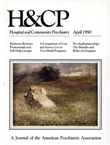Teaching Chronic Psychiatric Inpatients to Use Differential Attention to Change Each Other's Behaviors
Abstract
For nine months, all psychiatric inpatients who came into a 26-bed coed adult ward in a state hospital were taught the principles and application of differential attention to determine whether it could be a used as a significant therapeutic modality on a ward for chronic patients. In two half-hour classes each week, patients were encouraged to praise each other's desirable behaviors and ignore undesirable ones. Thirteen patients were measured for improvement of 21 behaviors that included self-care, adaptive, and social skills. The target behaviors doubled in frequency as a result of the intervention, and praise improved the performance of target behaviors whether the praise was prompted by staff or not. Men and women improved equally from the intervention. Behaviors that were consistently prompted by patients improved more than self-initiated behaviors. Patients who volunteered to be helped by peer praise appeared to benefit the most.
Access content
To read the fulltext, please use one of the options below to sign in or purchase access.- Personal login
- Institutional Login
- Sign in via OpenAthens
- Register for access
-
Please login/register if you wish to pair your device and check access availability.
Not a subscriber?
PsychiatryOnline subscription options offer access to the DSM-5 library, books, journals, CME, and patient resources. This all-in-one virtual library provides psychiatrists and mental health professionals with key resources for diagnosis, treatment, research, and professional development.
Need more help? PsychiatryOnline Customer Service may be reached by emailing [email protected] or by calling 800-368-5777 (in the U.S.) or 703-907-7322 (outside the U.S.).



